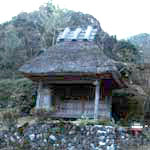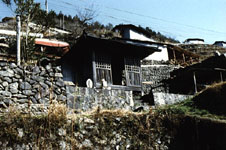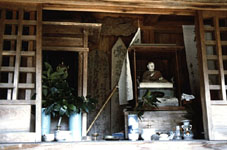Home > Encyclopedia of O-CHA(tea) > Chadou and Chaya
Main content starts here.
![]()
Chadou and Chaya
When
we cross a mountain pass and look
down the place where we are heading
for, it feels like a whole new world
is waiting for us. So to say, a
pass is a boundary to the two different
world. Japanese people may instantly
imagine "Chaya (tea shops)" when
they hear the word "touge" (pass)
because often the TV drama taken
place in Edo era, show edo style
tea shops at pass and as travelers
crossing the pass they sit on the
chair and have a cup of tea and
chat with other travelers or the
waitresses. The reason why at the
every pass had a tea shop was of
course to satisfy travelers thirst,
and also there was an another reason,
more of based on the old belief
of Japanese people. Touge is considered
as a boarder from and into the different
worlds. Also the word "Chaya(tea
shop)" itself holds a special meaning.
At the seaside of Mie prefecture,
villagers gather to the beach and
hold a memorial service for the
first Bon. During the service, the
tent where the tomb enshrined was
called "Chaya(tea shop)" At the
Bon festival in Hamamatsu city called
"Ensyu Dainenbutu", descendants
welcome the souls of ancestors and
entertain them with tea at Chaya,
and there is a song for that and
it is sang at the festival. In other
words, Chaya was also considered
as a door to the life and the life
after the death.
There are also
usually small buildings called "Chadou"
at the end of villages. Near the
Obon festival time, villagers come
to Chadou alternatively and entertain
the travelers who cross those pass
with some sweets and a cup of tea
for free. They probably see the
souls of ancestors in those travelers.
Here, also you can see the evidence
of the similarity of the ceremony
of Chaya for crossing the boarders.
(Yoichiro Nakamura)

Chadou
(Takaokagun,
Kouchi prefecture)

Chadou
( , Nishitosa village, Kouchi prefecture)

Inside
the Chadou
(Nishitosa village,
Kouchi prefecture)
